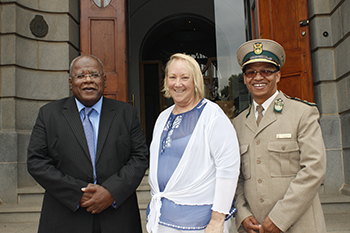Latest News Archive
Please select Category, Year, and then Month to display items
12 January 2024
|
Story Nonsindiswe Qwabe
|
Photo Sonia Small
 Since joining the UFS in 2008, Dr Grey Magaiza has worked extensively on approaches that can foster the socio-economic transformation of societies.
Since joining the UFS in 2008, Dr Grey Magaiza has worked extensively on approaches that can foster the socio-economic transformation of societies.
“The future should be one where communities can decide on their development agenda and futures. That’s the most important for me.” Dr Grey Magaiza, Deputy Director of the Centre for Gender and Africa Studies (CGAS) and Head of the Community Development programme on the Qwaqwa Campus, is passionate about capacitating communities to be agents of change and advancement. His vision for the future emphasises the empowerment of communities to take charge of their development by actively participating in decision making and the implementation of development projects that can improve their lives.
Since joining the UFS in 2008, Dr Magaiza has worked extensively on approaches that can foster the socio-economic transformation of societies. Over the years, he has crafted his research speciality into one that he is most proud of – being an interdisciplinary scientist immersed in the development of communities.
“I’m in a fortunate position of researching what I like. I say ‘fortunate’, because I’ve taken the time to understand what I’m passionate about, which is the overall field of rural livelihoods and livelihood futures – in short, community development. My research starts from an engaged university, understanding the elements that a university must use to enhance transformation and relevance to its immediate community in terms of development.”
One of the ways he has done this is by looking at social entrepreneurship as a development approach for young people in a rural setting. Through workshops with non-profit and civic organisations in Qwaqwa, Dr Magaiza has been helping these organisations to map out their needs and actively meet them through the involvement and support of external role players.
“We understand that communities are part of the national development agenda, but even that national agenda respects community knowledge and intentions and allows communities to shape their identity. A critical enabler of this is community organising. You bring back the capacity in communities to have dialogues on issues affecting them as spaces for engagement, knowledge exchange, and for people to just talk about their way forward.”
By enabling communities to define their development agenda, they can address their specific needs, challenges, and aspirations, he said. “When I look at livelihood futures, it’s quite an exciting aspect of my work – it’s like looking into a fortune tellers’ globe, because you’re not deciding for communities what they should do, but the communities themselves take those decisions.”
UFS Postgraduate student council’s community project a success
2016-03-03

Prof Jansen Vice-Chancellor and Rector, Dr Henriette van den Berg, Director of Postgraduate School, and Mr Gustav Wilson, Regional Head: Development and Care, Free State and Northern Cape Region. |
The University of the Free State’s Postgraduate Student Council embarked on a courageous community engagement project for Mandela Day in 2015. The programme was aimed at assisting offenders at Tswelopele Correctional Centre pass their matric exams, thus granting them access to tertiary education.
The Postgraduate Student Council assisted the 2015 matriculants with study support, and motivated them during their final examinations in 2015. The council will play a bigger role this year by offering offenders at Tswelopele career advice and career guidance for when they leave the correctional facility, as well as study techniques to assist them throughout the year, to ensure a 100% pass mark in 2016.
Offenders who had participated in the Postgraduate Student Council project attended the Postgraduate School’s Open Day on 19 February. Of the 12 offenders, 11 passed their matric exams, while one is currently busy with his supplementary exams. Tswelopele has a 92% pass rate; it is the best performing correctional centre in South Africa.
The Tswelopele Correctional Centre also serves as a full-time high school (Grade 10-12), and TVET College, assisting offenders to register for tertiary education through various universities.
Prof Jonathan Jansen, Vice-Chancellor and Rector of the University of the Free State, said that he was immensely proud of the matriculants from Tswelopele Correctional Centre. He added that it is vital for every human being to receive a second chance. “Rehabilitation programmes are meant to give offenders a second chance at life, because we cannot give up on humanity. Correctional centres and rehabilitation centres are a societal responsibility. Society must not give up on offenders, everyone deserves a second chance, and we cannot give up on humanity.”
“To our offenders going through rehabilitation and all our young people who are our hope for the future of our beloved country, be encouraged. Dream again. Discover the wonder in your lives,” said Mr Gustav Wilson, Regional Head: Development and Care, Free State and Northern Cape Region.